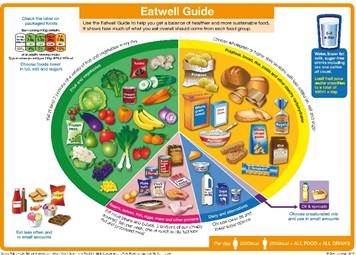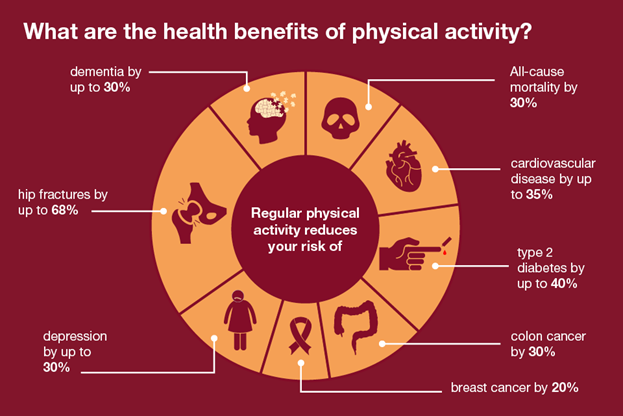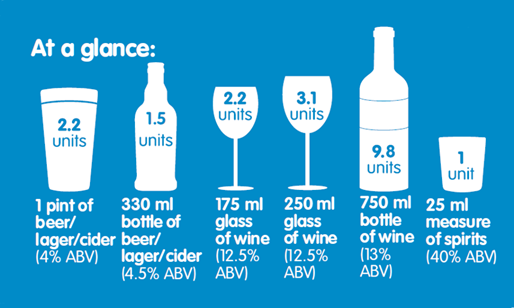Healthy Living
Welcome to our Healthy Living Section
This section has been provided by one of our GPs, Dr Louisa Milburn, who has undertaken this excellent piece of work as part of their Fellowship Project and provides useful information and links, to promote health & wellbeing. We hope you find it useful 🙂
A Guide to Improving Health and Wellbeing (Spring 2025)
This guide is based on ‘The Six Pillars of Lifestyle Medicine’. Evidence has shown that when practiced consistently, these pillars are central to maintaining health and helping to manage chronic disease.
The following leaflet introduces each pillar and gives some advice on how to make changes.
Nutrition
It can be difficult to know where to start with healthy eating. There are so many diets out there, which one to choose?
The bottom line is that it is essential to eat a wide variety of foods in the right proportions to get the nutrients we need. Take a look at the Eatwell Guide: https://www.nhs.uk/live-well/eat-well/food-guidelines-and-food-labels/the-eatwell-guide/

All diets have pros and cons. Pick one that suits your tastes, lifestyle and medical needs best. Beware of fad diets as these can be damaging to your health. Follow the link for more information on how to spot a fad diet: https://www.bda.uk.com/resource/fad-diets.html
A key component of all diets is eating less ultra-processed foods/drinks. The challenge now is that we increasingly consume an unnatural diet. Over 54% of the average UK adult’s diet is ultra-processed food (UPF) (PH Nutrition 2017;10.1017). There are a few definitions for this, but Chris Van Tulleken summed it up as:
“Most UPF is NOT FOOD, it is an industrially produced edible substance.” (Ultra-processed People: Why Do We All Eat Stuff That Isn’t Food...And Why Can’t We Stop?)
Follow this link for more information on the harmful effects of ultra-processed foods: https://www.nhs.uk/live-well/eat-well/how-to-eat-a-balanced-diet/what-are-processed-foods/
Physical activity
Keeping active isn’t just about weight loss and body image, it provides significant physical and mental health benefits. Take a look at the picture below for more information on the advantages.


Physical activity: applying All Our Health- Office for Health Improvement and Disparities
Where to start?
See the attached leaflet for your guide to physical activity in Shrewsbury; a list of a wide range of groups, clubs and sporting facilities available in the local area.
Remember, any movement counts and can be incorporated into your everyday life. For example, taking the stairs instead of the lift, parking further away from the shops, cycling to work or stretching exercises whilst waiting for the kettle to boil. Aim for 10 minutes per day and increase by 10% each month to gradually improve your exercise tolerance.
What should we be aiming for?
• >150 mins per week moderate aerobic activity or >75 mins/week vigorous aerobic activity, or combination
• Muscle strength- maintaining or building exercise >2 days per week
• Balance and flexibility training 2x per week (especially important in older adults)
|
Moderate aerobic activity |
Vigorous aerobic activity |
Strengthening activities |
Balance and flexibility |
|
Brisk walk |
Running |
Yoga/Pilates |
Yoga/Pilates |
|
Riding a bike |
Swimming |
Weights |
Heel toe walk |
|
Dancing |
Aerobics |
Heavy gardening e.g. digging |
Standing on one leg |
|
Pushing a lawnmower |
Sports like football, hockey, netball |
Carrying heavy loads e.g. shopping bags, children |
Walking upstairs |
Sleep
There is growing evidence that poor sleep is associated with poor physical and mental health. So what can we do to get a better nights sleep?
1. Sleep hygiene
- Have a fixed time for going to bed and waking up and avoid sleeping in after a poor night’s sleep
- Do relaxing activities before bed
- Create a comfortable sleeping environment
- Avoid daytime naps
- Avoid caffeine, nicotine and alcohol
- Daytime exercise (avoid vigorous exercise in the 4 hours before bed)
- Avoid eating a heavy meal late at night
- Avoid clock watching
- Avoid late night technology (phones, games consoles, TV etc)
2. Retrain you sleeping habits
- Allow your mind to associate your bed only with sleep
- Avoid lying in bed when you are not sleepy (get up and do something calming and then return to bed when you feel sleepy)
- Keep electronics out of the bedroom
- Avoid doing anything that is too stimulating or interesting
3. Manage your own expectations about sleep
- You don’t need to get a certain number of hours sleep to feel refreshed
- Try not to panic about getting back to sleep
- Use a sleep diary (see example below)
4. Meditation and relaxation
- Read a book
- Have a bath
- Listen to relaxing music
- Gentle exercise such as yoga
- Mindfulness/controlled breathing
- Sleep stories via apps such as Calm, Headspace
5. Put the worries aside
- Use a notebook to write down your problems/worries to get them off your mind
- Tackle any problems that can be sorted during daylight hours so that they are not on your mind at night
- You can cope better than you think with less sleep!
6. Sleep restriction: Limit the time you spend in bed each night and gradually lengthen this to discover your optimum bedtime and sleep schedule
Further resources:
https://thesleepcharity.org.uk/national-sleep-helpline/ Call the helpline on: 03303 530541
Example of a sleep diary:
|
Date: |
|
|
What time did you go to bed last night? |
|
|
What time did you turn the lights out? |
|
|
How long did it take for you to drop off to sleep? |
|
|
After falling asleep, how many times did you wake up in the night? |
|
|
How long did you sleep in total last night (record in hours – e.g. 5 hours 30 minutes)? |
|
|
If you found if difficult to sleep, what did you do while you were awake? |
|
|
What time did you wake up in the morning? |
|
|
What time did you get up? |
|
|
How long did you spend in bed in total last night (including time spent awake)? |
|
|
How long did you spend asleep last night? |
|
|
On a scale of 1–10, how would you rate the quality of your sleep last night? |
|
|
How many drinks containing caffeine did you drink yesterday (e.g. tea, coffee, fizzy drinks)? How many after 6pm? |
|
|
How much alcohol did you drink yesterday? |
|
|
Did you have any naps during the day yesterday? How many and for how long were you asleep? |
|
|
How much moderate to vigorous exercise did you carry out yesterday? (e.g. swimming, brisk walking, dancing, aerobics, gardening) |
|
|
Did you take any sleeping tablets last night? |
|
|
Did you take any other drugs? If yes, which ones? |
|
|
Did you have any stresses or other problems yesterday? |
|
|
Anything else important? |
|
Mental wellbeing
Do you have concerns about your mental wellbeing? This could include symptoms such as low mood, stress or anxiety. Take a look at resources below which may help.
Emergency no: 0808 196 4501
Shropshire Mental Health Support
Provides support and services to people in Shropshire living with mental health challenges. They provide 24/7 telephone support, peer support groups and cafes. The Wellbeing Vehicle provides direct support to individuals in crisis. Follow the link below for more information or call them on 01743 368647. https://www.shropshiremhs.com/
Self-refer for talking therapies
This is a free NHS service for people aged 16 and over which provides talking therapies for common mental health problems such as anxiety and depression.
For more information or to self-refer call 0300 123 6020 or follow the link to self-refer and for further resources :https://www.mpft.nhs.uk/services/talking-therapies/stw-talking-therapies
5 steps to mental wellbeing
Evidence suggests there are 5 steps you can take to improve your mental health and wellbeing. See more information here: https://www.nhs.uk/mental-health/self-help/guides-tools-and-activities/five-steps-to-mental-wellbeing/
Samaritans
If you’re having a tough time and need someone to speak to call the Samaritans any time for free: 116 123
Mind charity
For information on and support for mental health matters https://www.mind.org.uk/about-us/what-we-do/
No panic
A charity which helps and supports those living with Panic Attacks, Phobias, obsessive compulsive disorders and other anxiety related disorders. Helpline everyday 10am-10pm 0300 772 9844
BeeU
Provides emotional wellbeing and mental health services for children and young people 0-25. Follow the link below for more information and further resources: https://camhs.mpft.nhs.uk/beeu
Kooth
Online CTB for 11-25 year olds. Get free, safe and anonymous support.
Papyrus
A charity dedicated to the prevention of suicide and the promotion of positive mental health and emotional wellbeing in young people. https://www.papyrus-uk.org or 0800 0684141
Young Minds
A charity for young people with mental health concerns https://www.youngminds.org.uk
Shout
Text shout to 85258 any time day or night to start a conversation with a trained volunteer https://giveusashout.org/get-help/how-shout-works/
Minimizing harmful substances
Smoking cessation
Smoking is the primary cause of preventable illness and premature death in England. Giving up smoking can make a real difference to your health and quality of life. Please follow the link below for more information on quitting smoking.
https://next.shropshire.gov.uk/public-health/healthy-shropshire/stopping-smoking/
Alcohol
Alcohol is linked to a number of physical health conditions and can also had a negative effect on your mental health. Stopping or cutting down on alcohol can make a big difference.
It is recommended to drink no more than 14 units of alcohol per week, spread across 3 days or more.

Alcohol units at a glance Public Health Scotland
For help with cutting down, follow the link below:
For drug and alcohol support in Shropshire:
https://www.wearewithyou.org.uk/local-hubs/shropshire-recovery-partnership
Healthy relationships
Loneliness
Humans traditionally lived in tribes, but, in modern times, it has become more common to live in smaller groups or individually. Loneliness is something that affects all age groups. You can spend plenty of time around others but still feel lonely; it can take on many forms such as social loneliness, existential loneliness and emotional loneliness. Take a look at the below resources for more information.
https://www.nhs.uk/mental-health/feelings-symptoms-behaviours/feelings-and-symptoms/feeling-lonely/
https://www.campaigntoendloneliness.org/feeling-lonely/
Social prescribing/ community care coordinator
We have a social prescriber and a community care co-ordinator available. Please see the section on our website for more information. Our community care co-ordinator can help patients by coordinating support, signposting or referring to other services which may help them cope better with their everyday lives. Our social prescriber can help with a wide range or social, emotional or practical needs.
This is a general guide aimed at all patients, for specific tailored advice discuss this with a clinician or social prescriber.
Let's Get Moving - Your Guide to Physical Activity and Wellness in Shrewsbury
Page created: 29 April 2022